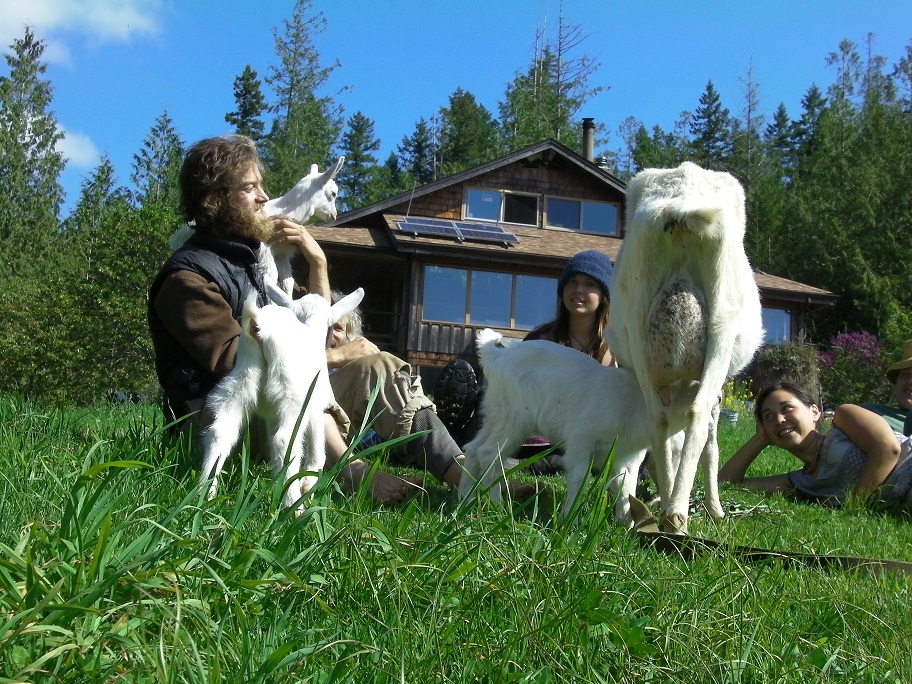Farm Share

What is farm-sharing?
As we nourish dreams of living in community with others, sharing in the work and pleasures of the farm, and being linked into the greater community of Cortes Island, we have come to build unique relationships with those living at BlueJay Lake Farm on a long-term basis. Rather than WWOOFing (living here in exchange for working on the farm), some members of our community live in our rental homes or their own tiny homes, sharing in aspects of the farm.
Farm-sharing households produce or otherwise provide their own food, share in the stewardship of the land and farm as a partial contribution to their tenancy, and have the opportunity to partake in existing farming activities or try out some of their own.
Why do we want to share the farm?
We want to live and work with others who are interested in making similar lifestyle choices because it enriches our lives. It brings knowledge, energy, interest, and an opportunity to try new endeavors. Our long driveway means we have no close neighbours, and we appreciate the community that has formed by those living on the farm. Since we have switched to farming mainly for subsistence rather than for production, we don't require as much land to meet our needs – sharing the land and infrastructure is a way to make farming and a rural, natural lifestyle accessible to others who also enjoy it.
The infrastructure for farming activities at BlueJay Lake Farm already exists – greenhouses, mountains of compost, garden supplies, irrigation systems, fencing, a barn, livestock, fields, sheds, workshops, etc. With additional community members partaking in using and maintaining the infrastructure it is less work for each person. It’s also more enjoyable to work on projects together. Caring for livestock that need to be milked regularly is a huge commitment, but as more households participate this also makes it easier for folks to spend time off the farm.
How does it work?
Sharing the farm is something that evolves over time with each new household. As a farm community, we would like each person to contribute in the way that they enjoy and are skilled at, which also supports the needs of the farm. One person might like traipsing through the bush fixing the telephone line or maintaining trails; another might really like selling extra produce at the Farmer's Market or working with the animals. Almost all of the current farm residents have chosen to live here after arriving as Wwoofers or apprentices, which has been a good way to determine the right fit.
Other aspects of farm sharing at Blue Jay Lake
Timing: Ideally, the new farming season starts each winter, and we would like people to commit to at least one year. The school calendar does not coincide with the farm calendar, and we realize this may need to take priority.
Rent: The rental money is required to help pay for the development and upkeep of buildings, contribute to the cost of utilities, and contribute to property taxes.
Firewood: Most buildings at BlueJay Lake Farm use wood stoves. For environmental reasons, we require you to burn dry wood. It should be cut by the end of March for the next winter at the latest, though preferably one year in advance. Firewood is gathered on your own time, and with your own equipment. We could trade sawmill slab firewood for help at the sawmill.
Utilities: Farm utilities (water, electrical, telephone) require careful management and maintenance.
Driveway: Our driveway is 3 kilometres long and is maintained by those living on the farm. We try to use it as little as possible. To compensate for the expense of the maintenance we charge $2 - $5 per round trip per vehicle. Some residents choose to leave their vehicles in the parking lot at the end of the driveway, and use a bicycle to go back and forth. Children attending school walk or cycle the driveway each school day.
Contact us to learn more about availability of farm-share arrangements at Blue Jay Lake farm or for details on the above.
